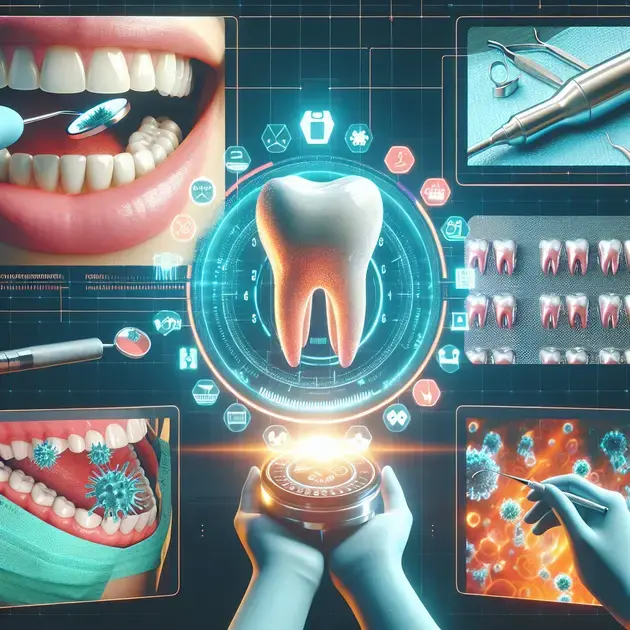Understanding the best medication for periodontitis is essential in effectively managing this serious gum infection. Periodontitis, also known as gum disease, is a common condition that can lead to tooth loss if left untreated.
With advancements in dental research, there are now various medications available to help combat periodontitis and improve gum health. From antibiotics to antimicrobial mouthwashes, understanding the options can greatly benefit patients in their treatment journey.

Key Approaches to Treating Periodontitis
Periodontitis, a severe form of gum disease, requires careful treatment to prevent further oral health complications. Here are some key approaches to effectively treating periodontitis:
1. Professional Dental Cleaning
Schedule regular dental cleanings with a professional dental hygienist to remove plaque and tartar buildup, which can contribute to periodontitis. Websites like American Dental Association offer resources to find trusted dental professionals.
2. Scaling and Root Planing
This deep cleaning procedure removes plaque and tartar from below the gumline and smoothens the tooth roots to promote healing. Visit a periodontist for this treatment, and you can find qualified specialists on American Academy of Periodontology.
3. Antibiotic Therapy
Antibiotics may be prescribed by your dentist or periodontist to help eliminate the bacteria causing the infection in your gums. Always follow the medication instructions provided by healthcare professionals. You can learn more about antibiotic therapy on the Mayo Clinic website.
4. Gum Surgery
In severe cases of periodontitis, surgical intervention might be necessary to reduce the depth of pockets between the teeth and gums. Find reputable periodontal surgeons through online platforms like Healthgrades.
Exploring Different Medication Options
Medications can play a crucial role in managing periodontitis and preventing its progression. Here are some medication options to explore:
1. Antibacterial Mouthwash
Using an antibacterial mouthwash, such as chlorhexidine, can help reduce bacterial growth in the mouth and control the progression of periodontal disease. Look for trusted brands like Listerine that offer these products in local pharmacies or online stores.
2. Topical Antimicrobial Agents
Topical gels or chips containing antimicrobial agents like doxycycline can be placed directly in the periodontal pockets to target the bacteria causing the infection. Your dentist may recommend products like Atridox or PerioChip for this purpose.
3. Systemic Antibiotics
In some cases, systemic antibiotics in pill form may be prescribed to combat severe infections in the gums. Your healthcare provider can provide information on antibiotics such as amoxicillin or metronidazole and their potential side effects.
Benefits of Understanding Medication for Periodontitis
Having a thorough understanding of the medications used to treat periodontitis can lead to improved oral health outcomes and better management of the condition. Here are some benefits of understanding medication options:
1. Effective Treatment Planning
Knowing the medications available for periodontitis allows healthcare providers to create personalized treatment plans tailored to the individual needs of patients. Understanding how medications work can help in achieving optimal results.
2. Reduced Risk of Complications
By understanding the role of medications in managing periodontitis, patients can lower the risk of complications associated with untreated gum disease, such as tooth loss or systemic health issues. This knowledge empowers individuals to take control of their oral health.
3. Improved Compliance and Follow-Up
Education about medication options can enhance patient compliance with treatment regimens and encourage regular follow-up visits with dental professionals. Websites like WebMD offer reliable information on medication adherence and the importance of follow-up care.

Effective Strategies for Managing Periodontitis Medication
When it comes to managing periodontitis medication effectively, there are several key strategies that can be implemented to improve treatment outcomes. One important approach is to ensure proper adherence to the prescribed medication regimen. This includes taking medications as directed by your healthcare provider and following any specific instructions provided.
Another effective strategy is to maintain good oral hygiene practices, such as regular brushing and flossing, to complement the effects of the medication. By keeping your teeth and gums clean, you can help prevent further progression of periodontitis and enhance the effectiveness of the medication.
In addition to medication and oral hygiene, lifestyle factors can also play a role in managing periodontitis. Eating a balanced diet, avoiding tobacco use, and managing stress can all contribute to better treatment outcomes and overall oral health.
Furthermore, regular dental check-ups and professional cleanings are essential for monitoring the progress of treatment and making any necessary adjustments to the medication regimen. By staying proactive and working closely with your healthcare team, you can effectively manage periodontitis medication.
Innovative Approaches to Periodontitis Treatment
As research and technology continue to advance, new innovative approaches to periodontitis treatment are emerging. One such approach is the use of laser therapy to target and remove infected tissue, promoting faster healing and reduced inflammation in the gums.
Another innovative technique is the use of probiotics to restore the balance of good bacteria in the mouth, which can help prevent the growth of harmful bacteria that contribute to periodontitis. Incorporating probiotic-rich foods or supplements into your diet may complement traditional treatment methods.
Furthermore, advances in regenerative medicine have led to the development of new techniques such as tissue engineering, which aims to regenerate damaged gum tissue and bone lost due to periodontitis. These cutting-edge approaches show promising results in improving treatment outcomes and promoting long-term oral health.
By staying informed about the latest developments in periodontitis treatment and being open to trying new approaches, patients can explore innovative options that may enhance the effectiveness of their overall treatment plan.
Optimizing Medication for Periodontitis Management
Optimizing medication for periodontitis management involves a comprehensive approach that considers various factors to ensure the best possible outcomes. One key aspect is to work closely with your healthcare provider to determine the most suitable medication based on the severity of your condition and any underlying health issues.
It is important to follow the prescribed dosage and frequency of medication to maintain consistent levels in the body and maximize the effects on combating periodontitis. Any adjustments to the medication regimen should be made in consultation with your healthcare provider to address any changes in your oral health status.
Additionally, monitoring and tracking your response to the medication through regular check-ups and evaluations can help identify any potential side effects or areas for improvement. Open communication with your healthcare team is essential for optimizing medication and ensuring that it remains effective in managing periodontitis.
Furthermore, staying informed about new medications and treatment options can provide opportunities to explore alternative approaches that may offer additional benefits or better align with your individual needs and preferences for periodontitis management.
**
Conclusion
**
Effective management of periodontitis medication is crucial for improving treatment outcomes. By adhering to the prescribed medication regimen and maintaining good oral hygiene practices, such as regular brushing and flossing, individuals can enhance the effectiveness of the medication and prevent further progression of periodontitis. Lifestyle factors, including a balanced diet, avoiding tobacco use, and managing stress, also play a significant role in achieving better treatment outcomes and overall oral health.
Innovative approaches to periodontitis treatment, such as laser therapy, probiotics, and tissue engineering, offer promising results in promoting faster healing, restoring the balance of good bacteria in the mouth, and regenerating damaged gum tissue and bone. Staying informed about these advancements and being open to trying new approaches can enhance the effectiveness of the treatment plan and lead to long-term oral health benefits.
Optimizing medication for periodontitis management requires a comprehensive approach that involves working closely with healthcare providers to determine the most suitable medication based on individual needs. Following the prescribed dosage and frequency, monitoring responses, and staying informed about new medications are essential steps in ensuring that the medication remains effective. By maintaining open communication with healthcare teams and staying proactive in managing periodontitis, individuals can achieve optimal outcomes and long-term oral health.



